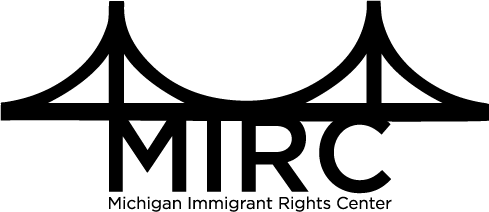
I am a Washtenaw County-focused staff attorney with the Michigan Immigrant Rights Center. I have held that position for about a year and a half.
The Washtenaw County immigration legal services grant that funds my work was born of the work of local community advocates and the County Board of Commissioners. In 2017, community advocates such as the Washtenaw Interfaith Coalition for Immigrant Rights (WICIR) saw the need for increased practical support for immigrants and their families dealing with the enormous—and often devastating—repercussions of increased and indiscriminate immigration enforcement. The Board of Commissioners responded to advocates’ mobilization by approving then-Commissioner Conan Smith’s resolutions for additional funding to assist immigrant communities. The Board approved additional short-term funding for emergencies brought about by immigration enforcement—such as rent assistance for families and children left struggling after the deportation of a parent. It also created new funding for a new attorney at MIRC to provide direct legal services to immigrants in Washtenaw County, community education, and technical assistance to government agencies and organizations who work with immigrant communities.
MIRC has greatly expanded the scope of services through the Washtenaw County program. In many ways, the U.S. immigration legal system is designed to deny individuals’ dignity in various areas of life. Depending on your immigration status, you may lack access to safe work, healthcare, housing or even a valid ID card to prove who you are. We are fortunate that the Washtenaw County grant allows us to address any immigration-related issues people might have, both in direct immigration legal services and in those other challenges that are exacerbated by immigration status. Over the past year and a half, I have had the privilege to work with clients at all different stages in their journey—from teenagers who have just arrived seeking asylum, to adults applying for citizenship, to people who have spent decades living in the U.S. but are still waiting for legal recognition that this is their home and they have a right to stay. I have also had the opportunity to advise clients on public benefits, options for healthcare, and tenants’ rights.
A unique aspect of the Washtenaw County program within MIRC is that it is defined by a small geographic area. The community is defined by supportive partners—WICIR, the Washtenaw Health Plan, the Washtenaw ID project—whose work aids clients in accessing non-legal resources, and who share technical support on their areas of expertise for our clients.
I also am reminded every day how vibrant and interconnected each member of the community is. When a client is detained or threatened with deportation, I know that not only she and her family will be devastated—coworkers and congregants she worships with will suffer, and children who go to school with hers will be forced to wonder if the same will happen to their parents. This threat to our community is what motivates me in this work. I am also a Washtenaw County resident and I want support my neighbors as they seek the same dignity and equal opportunity in this community, their home.
- ‹ previous
- 9 of 20
- next ›

